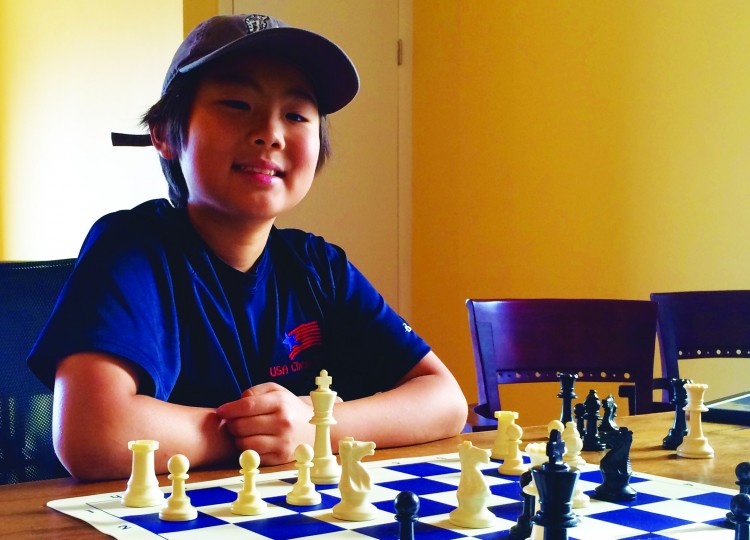

Maximillian Lu, the nation’s youngest chess master, enters the office of the Greenwich Sentinel equipped with a backpack containing a chessboard, 34 game pieces and a blindfold.
The 9-year-old has been challenged to a chess match.
Max, a student at Whitby, is wearing a navy blue shirt that reads, “U.S. Chess Team”—his apparel for international competition. He unrolls his flexible game board, spills the pieces onto the table, and assigns each piece to its designated spot.
In 15 brisk moves—roughly the time it took him to set up the board—Max and his army of white pawns win game one.
Then the blindfold comes on.
Max turns his chair around, places the small red blindfold over his eyes, and makes his first move of game two.
“Pawn to D-4,” Max says with his father, David, sitting next to him.
David moves the pieces according to Max’s instructions, as his son visualizes the game in his head with only the help of my words relaying my own moves on the board: “Knight to F-3. Pawn, D-5. Knight to D-5.”
As an attempt to capture Max’s knight goes wrong, David corrects my outdated terminology before Max settles the situation with his world-class knowledge of the game and ability to adapt.
“It’s knight takes D-5,” David says helpfully before he’s interrupted by his son, still facing in the opposite direction.
“No, he can say knight to D-5,” Max says. “That’s how they say it in Europe.”
This time, blindfold and all, it only takes nine moves for Max to corner my king and announce checkmate.
Just 28 days shy of his 10th birthday, Max earned the National Master title earlier this month at a tournament in Scarsdale, N.Y., making him the youngest master in United States chess history.
“I practice around 45 minutes to an hour each day,” Max says. “Sometimes a little bit more and sometimes a little bit less, depending on how much homework I have.”
About four years ago, Max decided to join a chess group for an after-school program, and he says his goal since then has just been to keep improving.
Starting in 2013, Max has played in international competitions representing the U.S. under-10 division in the United Arab Emirates and South Africa.
In September, Max won the opening game of the Scarsdale tournament before facing an opponent in the following round whom he had lost to twice before.
Playing under time control rules, Max offered a draw to his opponent after building a “fortress” in a theoretical draw position. Max had less than 30 seconds left on his game clock while his opponent had well over four minutes.
“Max had to keep defending his fortress, basically,” David said. “Max offered a draw, and the guy refused.”
With both players working against each other and the clock, Max’s fortress was eventually cracked, resulting in a tough technical loss.
“Max was completely…”
“Upset,” Max said, bluntly finishing his father’s sentence.
However, the loss didn’t knock Max out of contention for the record.
In fact, Max takes pride in his ability to learn from his losses and credits that to the record-breaking game that followed.
“He was very nervous,” Max said, recalling his historical win.
“Who was?” asked his seemingly confused father.
“You were,” Max responded.
After a loss, Max says he tries to fix his mistakes before his next game.
The victory would put Max ahead of Awonder Liang as the youngest chess master in the country at 9 years, 337 days old.
“He thought because he lost the previous game that he didn’t have a chance at the record,” David said. “It was really the ability to…”
“Come back,” Max said with a set of pawns in his hand, resembling a veteran poker player with his chips.
“Even an adult would be pretty upset after defending for over 130 moves in what should be a draw position, but then losing because you don’t have time,” David added.
“Max came back in that last game and was able to win easily. He didn’t let that one game affect the next one, even though it was very…”
“Painful,” Max said.
“Within five minutes he was able to settle himself and play the board to come back.”
David says it’s the losses that create learning experiences for his son. “For the most part, he’s able to come back from difficult losses. I think one of the good things about chess, or any sport, really, is that those type of things don’t only apply to that sport, but for any situation in life. It just happens to be in this situation, chess.”
Besides chess, Max enjoys playing tennis, soccer, swimming, and skiing in the winter. He also practices with a chess coach he meets with once a week.
David practices with Max too, but admits their games are not very close at all.
Next month Max will travel to Greece for an international tournament. He hopes to hang out with his friends in town before then and also make new international friends overseas.
“It’s going to be pretty long,” Max said about the two-week long tournament in Thessaloniki. “I just have to get a lot of rest. Just relaxing and studying a little bit, but not too much.”




